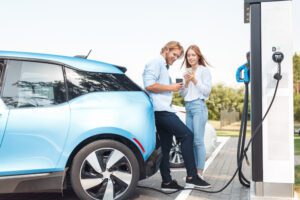
The government risks missing its electric vehicle uptake targets unless it offers motorists tax breaks, the UK’s largest online car retailer has warned.
Auto Trader said that interest in EVs has slumped by almost two thirds since the beginning of 2022 as motorists are deterred by high prices, the cost of living crisis and the hike in energy prices.
Demand for EVs hit record highs in the wake of the nationwide fuel shortages in October 2021 and after Russia invaded Ukraine, which pushed petrol and diesel prices to almost £2 a litre in vast swathes of the country. But prices have fallen dramatically in recent months, while household budgets have been squeezed by inflation elsewhere.
Auto Trader’s Road to 2030 report highlights that while EV owners with a home charger can save up to £130 for every 1,000 miles by charging at off peak overnight rates, savings reduce to £40 for those drivers using public chargers. There are calls for ministers to address the discrepancy with VAT, with motorists charging at home paying 5 per cent domestic VAT while those using public chargers pay 20 per cent.
The report adds that EV uptake is hampered by a lack of affordable choices, with the number of new electric models between £20,000 and £30,000 — the most popular price bracket for the retailer — actually decreasing, less than seven years before the government’s ban on the sale of new petrol and diesel sales comes into force.
Ian Plummer, the commercial director of Auto Trader, said: “We are in danger of veering off track. If the government is serious about achieving its ambitions, it needs to do more.
“While the extra £380 million announced in March to improve charging infrastructure will help, the goal of mass adoption is at risk unless we use the tax system inventively to spur on EV purchases and accelerate demand.
“Without action, specifically on affordable options and battery health confidence, the used electric market — which is both key to the success of the new electric market and to ensuring a fair transition to electric — will continue to falter.”
The report also warns that the introduction of vehicle excise duty on EVs in 2025 will further reduce the incentives for ownership. On average, new EVs are 37 per cent more expensive than petrol and diesel cars — a figure that has not changed since June 2022.
Rod Dennis, RAC spokesman, said: “It’s a shame the government isn’t looking at introducing a grant to help stimulate the cheaper end of the EV market.”
Read more:
Tax breaks urged to recharge UK’s struggling electric vehicle market





